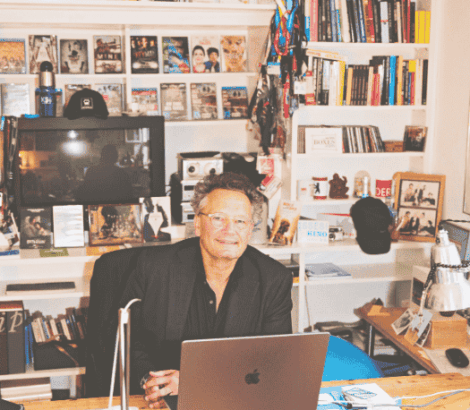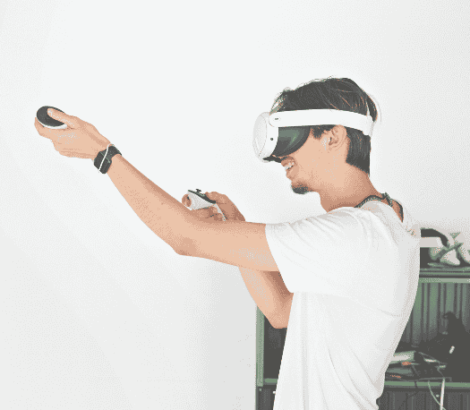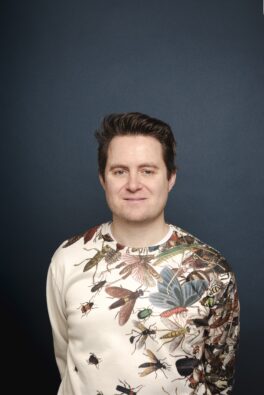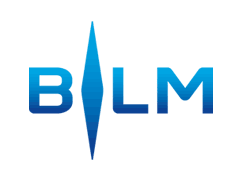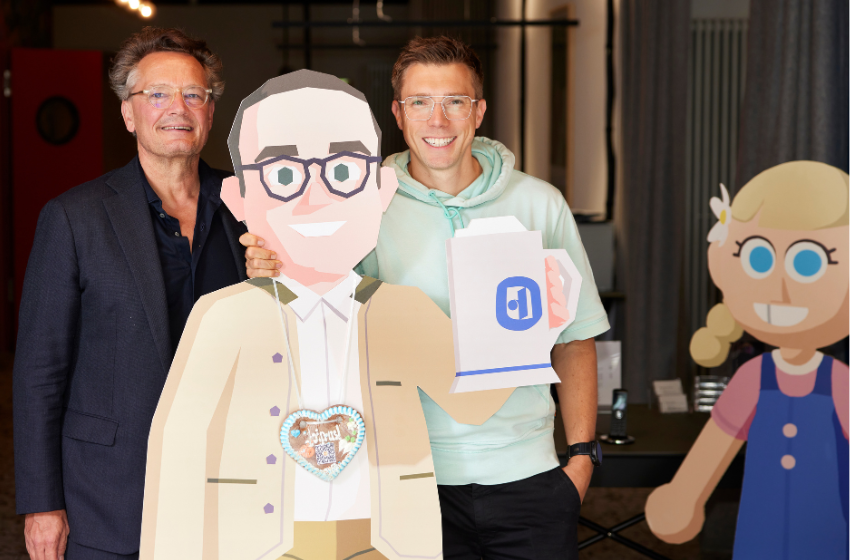
K5 Factory: From Film Production to the Metaverse
30 years ago, the K5 Media Group, which now operates internationally, was born in the heart of Munich. Many celebrated film productions later, Managing Director Oliver Simon is once again tapping into new business areas - and is now focusing on the trend technologies of virtual reality and augmented reality with the K5 Factory.
Anyone who hears actor names like Adam Driver, Clive Owen or Amanda Seyfried will not usually associate them with a backyard in Giesing. And yet all three play roles in films produced or distributed by Oliver Simon's K5 Media Group at Konradinstrasse 5 – or both. With a keen sense for current trends, he and his companions, Oda Schaefer, Dr. Daniel Baur and Sascha Prestel, have built an empire around the moving image here. The latest chapter is the group's VR/AR division, K5 Factory, which was founded in 2018 and has just taken on the major topic of virtual production. And it is currently celebrating the biggest project in its still young company history.
From script company to production company
Today's K5 Media Group began in the nineties, when there was still no money to be made from virtual reality. Back then, the newly qualified screenwriter Oliver Simon founded the script company FreeX (pronounced Freaks) with director Matthias Steurer and actor Götz Otto (known from the James Bond film “The World Is Not Enough”). “It has always been important to us to be ahead of current trends. Thirty years ago, that meant writing scripts in such a way that all the key players were involved right from the start. Our idea was that when writer, director and actor come together, good films are bound to come out,” says Simon. For Simon, it wasn't just about writing for long. “In 2001, Bavaria Film Studios approached me and asked if I wanted to become a producer too.”
The newly founded production company was christened K5 Film and was able to realize successful collaborations with directors such as Jim Jarmusch, Andrew Niccol and Mira Nair over the next few years. Films such as “Paterson” starring Adam Driver brought the K5 Film team to the red carpet in Cannes, while the co-production “Land of Mine” even received one of three Oscar nominations in addition to numerous international awards. Today, the production company is part of the umbrella organization K5 Media Group, as is the K5 International division founded in 2007 with Dr. Daniel Baur. The latter specializes in the worldwide distribution of feature films, such as Kevin Costner's “Horizon”. All of his films produced outside the studio system, such as “Dances with Wolves”, “Open Range” and others, are also represented there.
Telling stories where the audience is
“The nucleus of everything we do is storytelling,” says Oliver Simon about his company today. “There will always be a need for this, even if the medium continues to evolve.” The K5 Media Group is also constantly evolving with the medium. During a collaboration with director Andrew Niccol on the film “Anon” in 2018, Simon came into contact with the games industry for the first time and realized: K5 has to go where the viewers of tomorrow are – to gaming. “The film simply cried out to produce a game that was set in the same world and allowed us to actively develop the stories and characters,” says Simon.
However, this presented the company with a problem: “We had a lot of experience with producing films, but knew nothing about coding or producing video games.” Simon acquired the necessary know-how through a cooperation with ARRI. At the time, the renowned camera manufacturer had an internal future lab that dealt with AR and VR. “We've had close ties with ARRI for a long time, and I sometimes spent whole nights in their post-production rooms,” says Simon. When ARRI later decided to focus solely on the hardware, lighting and camera business again, Simon didn't want to give up the project – and moved the entire team to Konradinstraße. The K5 Factory was born.
Those who love their games do contract work
Although the pandemic represented a huge growth spurt for the video games industry itself, VR gaming was still in its infancy in terms of sales and distribution. But for Simon, this was the decisive factor in fully embracing VR and AR. “There is a lot of oversaturation in the video games industry. As a small studio that was only founded in 2018, we wouldn't have stood a chance. That's why it was clear to us right from the start: VR first.” According to Simon, this was the only way to develop a unique selling point and ensure success in this new area for the media group.
Nevertheless, the pandemic almost broke the young company's back. “How can you sell a VR product during a lockdown if the customer can't come by in person and put on the glasses?” says Co-Managing Director Dr. Thomas Wagner. The business partner has been in charge of the GmbH's operational business since 2021. To keep their heads above water, he and Oliver Simon rely on commercial orders from companies. “We've done everything from AR advertising and virtual conferences in the Metaverse to VR exhibitions for museums.” Their clients gradually included big names such as BMW, Audi and Burda. The concept has not only saved them through the pandemic, but is now the company's strongest pillar. “In fact, we are already at the limit of our capacity. But the orders finance the game productions,” says Wagner.
In search of the recipe for VR success
Making VR suitable for the masses is a tough nut to crack, and one that even the big tech companies have been battling with for years. What's the problem? “For many people who have never worn such glasses, the topic of virtual reality is fraught with prejudice,” says Simon. For example, that VR is only for nerdy gamers who sit in the basement with their glasses on their heads. That's why Simon is convinced: “Only when we manage to free VR from the reputation of being nerdy will the technology reach the center of society.” Even tech giant Apple, which wanted to conquer the American market with its Apple Vision Pro at the beginning of the year – and the German market since July 2024 – is struggling. It has since been announced that the development of the Vision Pro 2 has been discontinued in favor of a more affordable entry-level model.
In Simon's opinion, the Vision Pro is already moving in the right direction – it is sleeker, more stylish and allows wearers to be aware of their surroundings while wearing them. Nevertheless, according to Simon, the Vision Pro is still some way off the ideal. “In my opinion, the goggles will only become really attractive to the end customer when they come close to ski goggles in terms of size and weight. Before that – and this is also the case with the Vision Pro – they are too big, too heavy and too strenuous for prolonged use.” In Simon's eyes, however, there are tactics behind the fact that Apple first brought out a professional model before working on an entry-level version. “For these glasses to be successful, they need content. Otherwise the cat bites its tail – without content, there's no need for the glasses, and without glasses, there's no incentive for studios to develop content.” For him, this is the key to Apple being able to open up the market for the general public after all. Since the Vision Pro was released, programmers all over the world have been working with the glasses. “When the next version comes out, the offer will be there.”
Oktoberfest atmosphere in the living room
The K5 Factory is making sure of that itself. Simon can't reveal which project his team is working on for the Apple glasses – the team is still too early in the development process for that. What he prefers to talk about is the new major K5 project: the official Oktoberfest game in VR, developed on the Meta platform for the Quest 3. The game is based on the relatively new and previously little-used game type Social VR: a multiplayer experience in virtual reality. Anyone wearing glasses – no matter where they are in the world – can meet up in the game, chat, go to the game booth together or simply enjoy the atmosphere. “The feedback we get is great. We take people's glasses off again after forty minutes, most of them think they've only been in for five minutes.”
The Free State of Bavaria has pledged half a million euros in funding for the project. Would it have worked without it? “Absolutely not,” says Simon. “We are lucky enough to receive funding at state, national and European level. As a VR studio, living solely from storytelling – I don't think that can work at the moment.” The studio is also in constant contact with the city of Munich, tent hosts such as Inselkammer and Schottenhamel – whose tent you can enter in the game – and of course the Wiesn boss himself, Clemens Baumgärtner. What does he think of the game so far? “During the first demo, he refused to take his glasses off for so long that he almost missed his next appointment.” The actual target group, however, are people who can't easily visit the Theresienwiese in person. “The market is mainly in the USA and Asia.” That, say both Simon and Wagner, is the great opportunity of VR: enabling people to have experiences that they would otherwise not have access to: “If we have our way, we will create a lot more content like this in the future.”

The figures are from the social VR game “Oktoberfest – The Official Game”, which was officially licensed by the City of Munich. / Photo: Sebabstian Arlt
Bannerbild: Photo: Sebabstian Arlt
